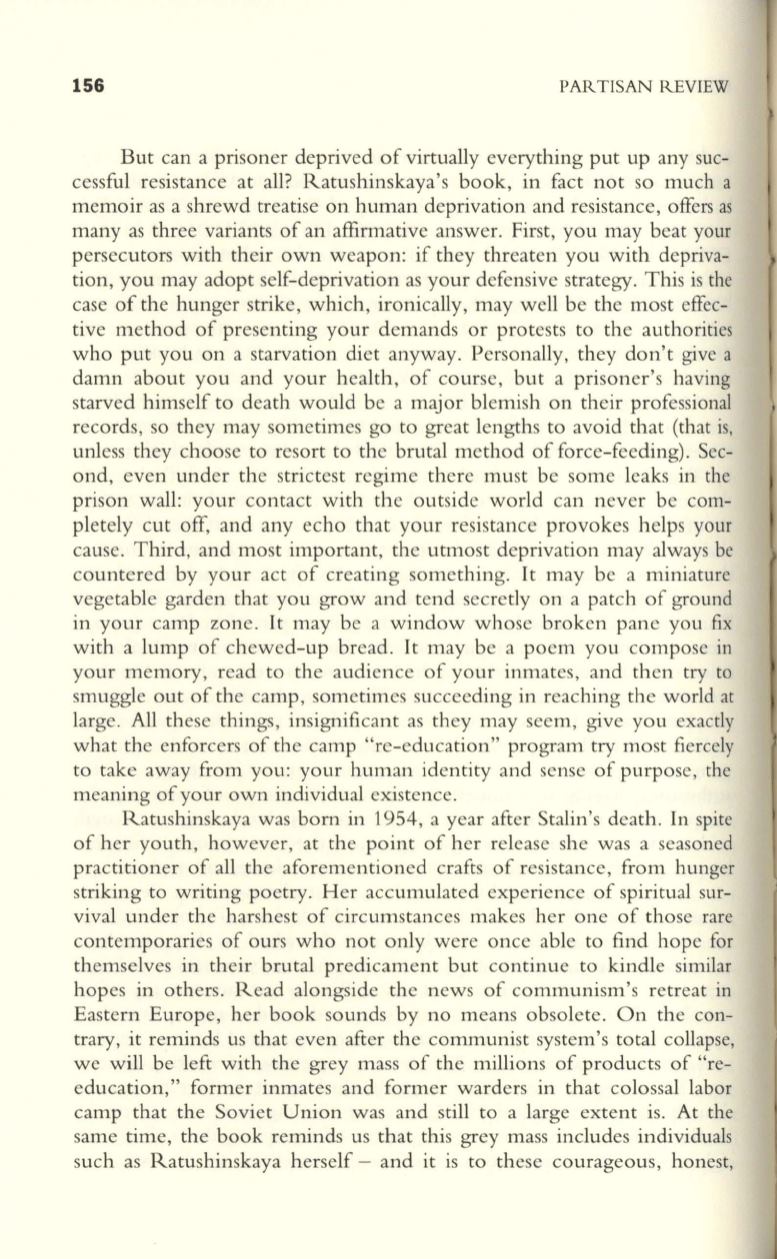
156
PARTISAN REVIEW
But can a prisoner deprived of virtually everything put up any suc–
cessful resistance at all? Ratushinskaya's book, in fact not so much a
memoir as a shrewd treatise on human deprivation and resistance, offers as
many as three variants of an affirmative answer. First, you may beat your
persecutors with their own weapon: if they threaten you with depriva–
tion, you may adopt self-deprivation as your defensive strategy. This is the
case of the hunger strike, which, ironically, may well be the most effec–
tive method of presenting your demands or protests to the authorities
who put you on a starvation diet anyway. Personally, they don't give a
damn about you and your health, of course, but a prisoner's having
starved himself to death would be a major blemish on their professional
records, so they may sometimes go to great lengths to avoid that (that is,
unless they choose to resort to the brutal method of force-feeding). Sec–
ond, even under the strictest regime there must be some leaks in the
prison wall: your contact with the outside world can never be com–
pletely cut off, and any echo that your resistance provokes helps your
cause. Third, and most important, the utmost deprivation may always be
countered by your act of creating something. It may be a miniature
vegetable garden that you grow and tend secretly on a patch of ground
in your camp zone. It may be a window whose broken pane you fix
with a lump of chewed-up bread. It may be a poem you compose in
your memory, read
to
the audience of your inmates, and then try to
smuggle out of the camp, sometimes succeeding in reaching the world at
large. All these things, insignificant as they may seem, give you exactly
what the enforcers of the camp "re-education" program try most fiercely
to take away from you: your human identity and sense of purpose, the
meaning of your own individual existence.
Ratushinskaya was born in 1954, a year after Stalin's death. In spite
of her youth, however, at the point of her release she was a seasoned
practitioner of all the aforementioned crafts of resistance, from hunger
striking to writing poetry. Her accumulated experience of spiritual sur–
vival under the harshest of circumstances makes her one of those rare
contemporaries of ours who not only were once able to find hope for
themselves in their brutal predicament but continue to kindle similar
hopes in others. Read alongside the news of communism's retreat in
Eastern Europe, her book sounds by no means obsolete. On the con–
trary, it reminds us that even after the communist system's total collapse,
we will be left with the grey mass of the millions of products of "re–
education," former inmates and former warders in that colossal labor
camp that the Soviet Union was and still to a large extent is. At the
same time, the book reminds us that this grey mass includes individuals
such as Ratushinskaya herself - and it is to these courageous, honest,


